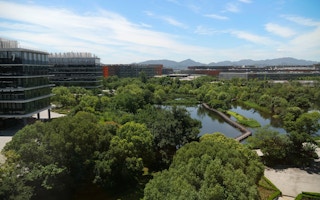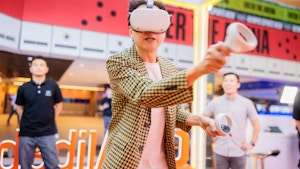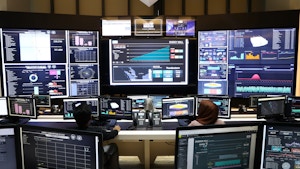Indoor environments in many offices across Asia are overcooled by air conditioning. Yet faced with the unavoidable reality of extreme heat creating stress and devastating impacts on urban communities, space cooling for buildings and urban districts looks likely to stay.
According to the International Energy Agency (IEA), the use of air conditioners is set to soar and become one of the top drivers of global electricity demand over the next three decades. By 2030, more than half of floor area additions will occur in places with a high need of space cooling – and by 2050, half of the air conditioning units globally will be in China, Indonesia and India.
Increasingly, real estate developers and corporations expanding their building spaces are looking to smart and advanced technology for better applications of cooling. On the need for urban cooling, the United Nations Environment Programme (UNEP) said that many of the available solutions to deliver on the challenge can be implemented at the urban scale.
“We cannot just air condition ourselves out of this crisis,” it said. “There is an urgent need to transition to more sustainable and equitable ways to cool down and ensure access to cooling where needed, without further warming the planet.
Slashing energy use in summer
Across the world, many cities have been scorched by the worst heatwaves in recent years.
Electricity generators are struggling to keep up with the surging temperatures during hotter-than-ever summers. In China, the power network which serves the country’s east coast region including economically-key cities such as Shanghai, Suzhou and Hangzhou, hit a peak load of nearly 400 million kilowatts (kW) during the summer period last year.
For tech company Alibaba Group, in anticipation of the challenges to ease the impact of the broiling summer heat on its Hangzhou campus that can accommodate thousands of employees, it has factored in smart technologies and the use of artificial intelligence (AI) to automate temperature control. This is among other energy-efficient solutions to save water and ensure access to nature.
Functioning as the firm’s headquarters since August 2022, the 423,000-square-metre corporate campus has indoor facilities mostly powered by air conditioning, which accounts for at least half of its power consumption spikes. However, with an AI-powered energy management tool designed by Alibaba Cloud, the group’s digital technology and intelligence backbone, scheduling for heating and cooling are better optimised.
According to statistics provided by Alibaba, in a pilot covering half the campus, yearly electricity use has been reduced by 600,000 kW-hours and energy use cut by 30 per cent during off-peak hours since the application of the solution.
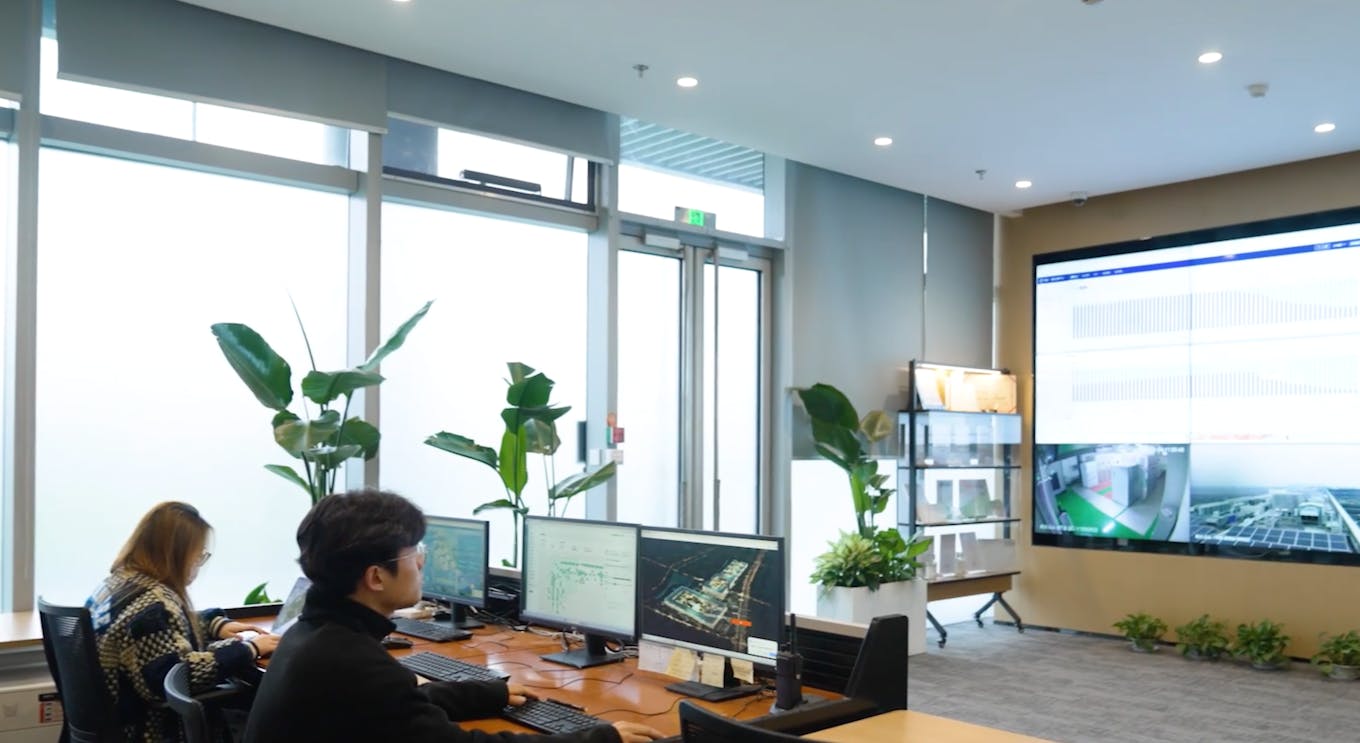
The application of Energy Expert helps to simplify and automate the process of turning up or down temperatures in various rooms or areas across the Alibaba corporate campus. Image: Alibaba
Known as Energy Expert, the platform has been able to better align its commands to turn up or down temperatures in various rooms or areas across the temperature by synthesising its predictions based on a combination of historical data and real-time data about weather conditions and occupancy, reducing the amount of energy wastage.
What this does is it simplifies the entire process and balances the modern need for cooling with environmental considerations, said William Xiong, vice president of Alibaba Cloud Intelligence.
Xiong shared that before the smart campus project, managers would manually turn on and off fans and other temperature control systems every day and many struggled with the timing.
“The weather outside constantly changes, the number of people using the various spaces across campus changes. While cooling systems collect sensor data, little action is taken based on the information.”
Conversely, with Energy Expert, more accurate predictions can be made and suggestions given to optimise energy use as well as cut emissions, in line with Alibaba’s group-wide drive to reach carbon neutrality by 2030, said Xiong. During peak periods when events are ongoing and offices are likely to be occupied, air conditioning units can release more cold air in advance to keep rooms cool.
‘Sponge city’ design
Alibaba Cloud has also attempted to replicate the efficiency savings tested out via its smart campus model for its partners in Southeast Asia, Xiong shared. This includes applying Energy Expert for speed cooling for manufacturing facilities and factories.
Beyond cooling, across the Alibaba campus, the use of AI also allows for the creation of accurate lighting schedules based on foot traffic in different rooms. In its design phase, the campus adopted a “sponge city” design known for its sunken gardens, permeable pavements and green rooftops to collect and distribute rainwater. This ensures that 70 per cent of the water used for irrigation across the campus is recycled rainwater.
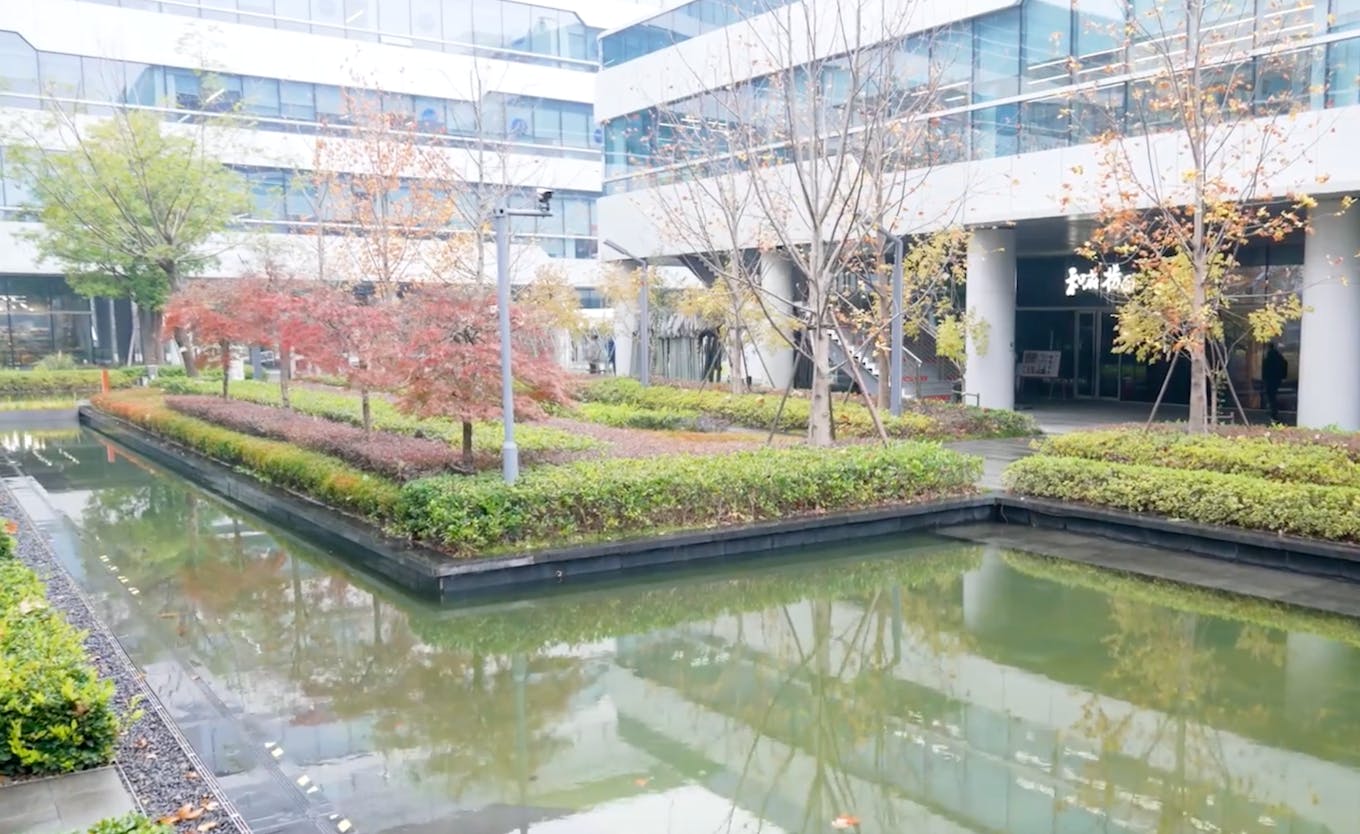
Gardens across the Alibaba corporate campus in Hangzhou are designed to be sunken so they can collect rainwater for recycling. Image: Alibaba
The term “sponge cities” is traditionally used to describe urban areas with abundant natural areas such as trees, lakes and parks or similar designs intended to absorb rain and prevent flooding.
Solar energy derived from rooftop panels also accounts for about 40 per cent of all electricity used within the compound. Hundred per cent of the street lights are solar-powered. Alibaba said that all its new constructions will also meet China’s green building standards, as well as the Leadership in Energy and Environmental Design (LEED) Gold Standard, a global certification developed by the United States Green Building Council, a non-profit.

Through a mobile application, employees working in Alibaba’s Hangzhou campus can also switch heating or air conditioning on or off. Image: Alibaba
What is interesting is that even with smart automation, urban campuses and commercial districts can also make use of technology to boost awareness of environmental protection through encouraging participation, said Xiong.
On the Alibaba campus, employees also have access to platforms such as Alibaba’s enterprise collaboration mobile applications that allow them to adjust temperature and lighting controls; they are offered incentives when adopting green behaviour, such as turning off the lights and air conditioning when leaving a room.

